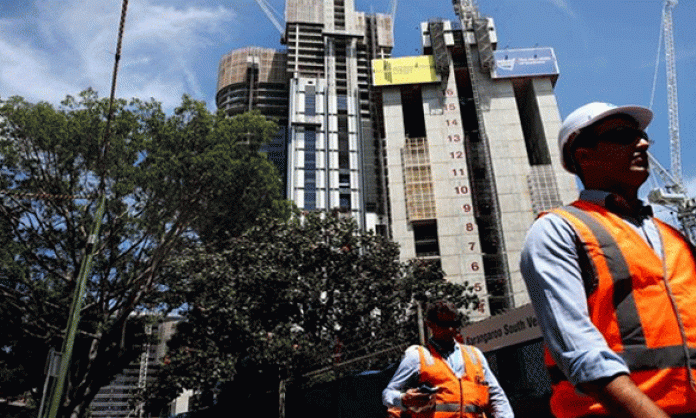Workers at the Barangaroo hotel and casino construction site in Sydney’s inner city have had an important victory.
About 100 concrete placers employed by De Martin and Gasparini, a subsidiary of multinational corporation Boral, put down tools on 13 February in response to an attack on wages and conditions. Their strike ended five days later, when they won the majority of their demands.
They have served a timely reminder to the bosses at Boral, and to those throughout the construction industry, of the power of organised working class resistance.
The company’s attack came in the form of a non-union enterprise agreement that the workforce voted to reject in December. The proposed agreement was tied to the federal government’s draft building code, a regulation – not yet through parliament – designed to crush union power in the construction industry by curtailing the scope for workers to bargain over wages and conditions. The agreement included a clause allowing De Martin and Gasparini to make every single worker casual. It removed a number of rostered days off, weekends off and the 36-hour week and forced a pay cut of between $50 and $100 a week.
Cameron, one of the striking concrete workers who was on the picket line, said to Red Flag: “I think it’s disgraceful that Boral are trying to put men, their livelihoods and their lives at risk.” This is no exaggeration. A worker on the site plummeted 30 metres to his death last year. Death and serious injury are all too common on construction sites in Australia.
But the bosses don’t see this as a tragedy. For them, tragedy is when the union health and safety rep refuses to let them cut corners or when workers win longer breaks.
Maximising profits means driving down wages, making work conditions more “flexible” and undermining the union – in this case the Construction, Forestry, Mining and Energy Union (CFMEU).
Brian Parker, CFMEU state secretary, spoke to Red Flag during the strike. He explained: “Boral has presented a completely inferior agreement. These men have had enough, and they also understand that they are going to set the standard for concrete placement workers everywhere.
“The bottom line is that Boral will do anything they can to get over the top of the CFMEU and the workers, in order to downscale wages and conditions. They will do anything that’s necessary to win this dispute.”
Parker was right. On day one, Boral bosses launched a campaign of intimidation against the striking workers, photographing every individual on the picket line. The company also rushed in scabs to continue laying concrete, refusing to give the scabs a proper site induction and failing to comply with established safety practices. But its desperate measures went to waste. Most scabs weren’t able to get onto the site. Union members maintained their picket with the help of supporters and solidarity from other unions including the Maritime Union of Australia.
Very quickly, the lack of concrete on the site began to hinder progress on the whole job. When it became clear that the entire multimillion dollar Barangaroo project – one of the biggest construction jobs in the country – could come to a grinding halt, the bosses backed down and offered striking workers a union-backed agreement.
When completed, James Packer’s six-star casino and apartment complex will be a veritable Disneyland for the rich. But this strike was a glimpse of the reality behind their fantasy: without workers, they would have nothing. Cameron had no doubt about this: “The people up there are wealthy because of the efforts of the men down here”, he said. “Sometimes we’ve got to show them what’s what.”











